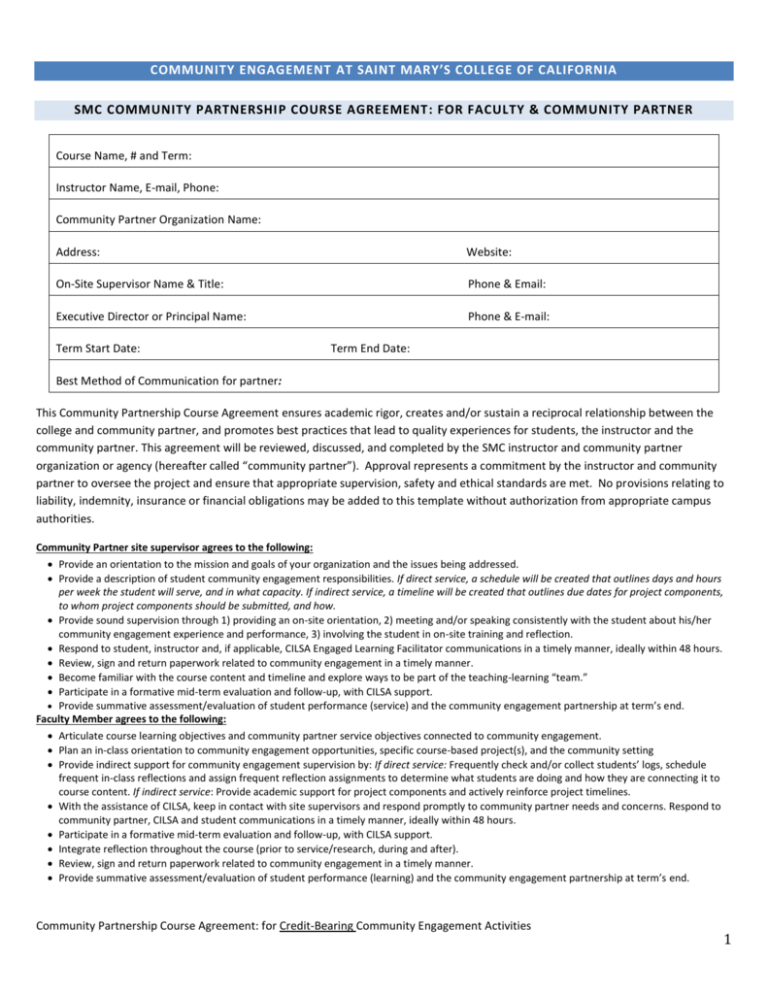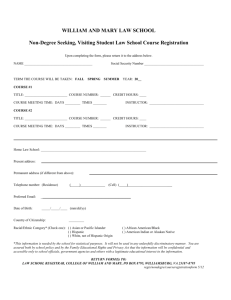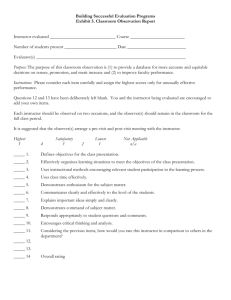Course Agreement Form - Saint Mary`s College of California
advertisement

COMMUNITY ENGAGEMENT AT SAINT MARY’S COLLEGE OF CALIFORNIA SMC COMMUNITY PARTNERSHIP COURSE AGREEMENT: FOR FACULTY & COMMUNITY PARTNER Course Name, # and Term: Instructor Name, E-mail, Phone: Community Partner Organization Name: Address: Website: On-Site Supervisor Name & Title: Phone & Email: Executive Director or Principal Name: Phone & E-mail: Term Start Date: Term End Date: Best Method of Communication for partner: This Community Partnership Course Agreement ensures academic rigor, creates and/or sustain a reciprocal relationship between the college and community partner, and promotes best practices that lead to quality experiences for students, the instructor and the community partner. This agreement will be reviewed, discussed, and completed by the SMC instructor and community partner organization or agency (hereafter called “community partner”). Approval represents a commitment by the instructor and community partner to oversee the project and ensure that appropriate supervision, safety and ethical standards are met. No provisions relating to liability, indemnity, insurance or financial obligations may be added to this template without authorization from appropriate campus authorities. Community Partner site supervisor agrees to the following: Provide an orientation to the mission and goals of your organization and the issues being addressed. Provide a description of student community engagement responsibilities. If direct service, a schedule will be created that outlines days and hours per week the student will serve, and in what capacity. If indirect service, a timeline will be created that outlines due dates for project components, to whom project components should be submitted, and how. Provide sound supervision through 1) providing an on-site orientation, 2) meeting and/or speaking consistently with the student about his/her community engagement experience and performance, 3) involving the student in on-site training and reflection. Respond to student, instructor and, if applicable, CILSA Engaged Learning Facilitator communications in a timely manner, ideally within 48 hours. Review, sign and return paperwork related to community engagement in a timely manner. Become familiar with the course content and timeline and explore ways to be part of the teaching-learning “team.” Participate in a formative mid-term evaluation and follow-up, with CILSA support. Provide summative assessment/evaluation of student performance (service) and the community engagement partnership at term’s end. Faculty Member agrees to the following: Articulate course learning objectives and community partner service objectives connected to community engagement. Plan an in-class orientation to community engagement opportunities, specific course-based project(s), and the community setting Provide indirect support for community engagement supervision by: If direct service: Frequently check and/or collect students’ logs, schedule frequent in-class reflections and assign frequent reflection assignments to determine what students are doing and how they are connecting it to course content. If indirect service: Provide academic support for project components and actively reinforce project timelines. With the assistance of CILSA, keep in contact with site supervisors and respond promptly to community partner needs and concerns. Respond to community partner, CILSA and student communications in a timely manner, ideally within 48 hours. Participate in a formative mid-term evaluation and follow-up, with CILSA support. Integrate reflection throughout the course (prior to service/research, during and after). Review, sign and return paperwork related to community engagement in a timely manner. Provide summative assessment/evaluation of student performance (learning) and the community engagement partnership at term’s end. Community Partnership Course Agreement: for Credit-Bearing Community Engagement Activities 1 COMMUNITY ENGAGEMENT AT SAINT MARY’S COLLEGE OF CALIFORNIA Plan for Student Community Engagement: These points should be negotiated and recorded. This template can be modified to reflect the specifics of student community engagement in the context of a particular course. Number of students, given community partner capacity: Number of hours per student and allocation of hours over academic term (Max 30 hours): What form will student community engagement take? Provide a detailed description of what students will do (nature of direct service, indirect service, or both). How will the community engagement experience respond to community partner priorities and contribute to the organization’s mission? How will you assess student learning? How will community engagement experiences be linked to course concepts? What course activities and assignments will demonstrate that students are connecting course concepts to community engagement experiences? In-Class Orientation Date, Time and Location: On-Site Orientation Date(s), Time(s) and Location(s): Important dates (i.e. SMC holidays and vacations) worth noting: What special preparation will be required prior to the start of community engagement? Special training (provided by community partner), TB tests, background checks (live scan or fingerprints), other? Community Partnership Course Agreement: for Credit-Bearing Community Engagement Activities 2 COMMUNITY ENGAGEMENT AT SAINT MARY’S COLLEGE OF CALIFORNIA Please follow the steps below and check each of the boxes as you do so: The instructor has shared the course syllabus with the community partner. I.R.B.: The instructor and community partner have reviewed and initialed the CILSA/I.R.B. Screening Document and determined if the community engagement project will require IRB review. Community Engagement Funds: The instructor and community partner understand that Saint Mary’s College of California provides community engagement funds for the following: student background checks, TB tests, and transportation to and from community engagement sites. These funds are managed by CILSA in partnership with the instructor. Funds for all other community engagement project components will come from the instructor’s school or department and/or from the community partner organization. SIGNATURES: By signing this plan you have read, understood, and agree to the terms set out in the pages above. Community Partner Signature Instructor Signature Date Date Both the instructor and community partner will keep a copy of this plan on file during and after the partnership experience. The instructor will provide CILSA with a copy of this agreement in advance of the community engagement course. For more information on best practices for community engagement, please see: www.stmarys-ca.edu/cilsa Community Partnership Course Agreement: for Credit-Bearing Community Engagement Activities 3 COMMUNITY ENGAGEMENT AT SAINT MARY’S COLLEGE OF CALIFORNIA Appendix: CILSA/I.R.B. Screening Document Research is defined for IRB purposes as activities intended to contribute to "generalizable knowledge.” The criterion that triggers the need for IRB approval in the course setting is whether the project is designed as research (to contribute to "generalizable knowledge") or whether it is designed strictly as a learning exercise with results that are not used outside the course setting. Research with human study participants requires IRB approval, whereas course exercises do not. Two very important points: - The intent to publish or otherwise publicly disseminate the results outside the course automatically establishes both the intent to contribute to generalizable knowledge and the need for IRB approval prior to beginning to collect data. - The IRB is not able under any circumstances to approve research retroactively. Working with an outside community partner can add complexity, because the ways in which the outside/community partner intends to use the data collected can also factor into your decision about the need to seek IRB approval. Some outside community partners have exceptions to IRB review for internal studies such as program reviews or needs assessments. However, your students gathering data for the partner may not be covered under that exception. It is NECESSARY to have a frank discussion with your community partner about the various possible uses of the data collected before beginning your study, as IRB approval cannot be obtained retroactively. The following represent the criteria employed by the IRB in reviewing proposals. These are based on the Belmont Report. - - Risks to subjects are minimized by using procedures which are consistent with sound research design and which do not needlessly expose subjects to risk. The research plan protects the privacy of subjects and the confidentiality of data. Risks to subjects are reasonable in relation to anticipated benefits (if any) to the subjects, and the importance of the knowledge that may reasonably be expected to result. Selection of subjects is equitable. The IRB will take into account the purpose of the research and the setting in which the research will be conducted, and will be especially cognizant of the special problems of research involving vulnerable populations. When some or all of the subjects are likely to be vulnerable to coercion or undue influence, such as children, prisoners, pregnant women, mentally disabled persons, or economically or educationally disadvantaged persons, additional safeguards have to be included in the study to protect the rights and welfare of these subjects. Informed consent will be appropriately documented. When appropriate, the research plan makes adequate provision for monitoring the data collected to ensure safety of subjects. Conducting research on BEHALF of a community partner is a gray area that warrants careful consideration and discussion between the instructor and community partner PRIOR to gathering, sharing and use of research results. Faculty AND students bear an ethical responsibility to adhere to ethical principles and best practice. The instructor is responsible for discussing application of these principles with the community partner EVEN if the instructor has no intention of disseminating the results of research conducted on BEHALF of the agency. This reflects an ethical behavior and tenet of “do no harm” as well as minimize risk to the instructor, students, community partner, the agency’s clientele, and subjects of the study. There is an ethical and legal imperative that faculty and/or students are not complicit (even unintentionally) in inappropriate or questionable research practice that places the instructor, students, college, or community partner at risk. Similarly, it is incumbent upon the instructor to go above and beyond applying ethical research principles to discuss and insure the safety of students conducting research on BEHALF of a community partner. A faculty member cannot and must not un-intentionally place SMC students at risk in the process of conducting research on behalf of an agency. Community Partnership Course Agreement: for Credit-Bearing Community Engagement Activities 4 COMMUNITY ENGAGEMENT AT SAINT MARY’S COLLEGE OF CALIFORNIA Questions for the Instructor and Community Partner Please read the questions below and check the appropriate boxes. 1. Does the instructor plan or anticipate presenting or publishing aspects of the course’s data-gathering activities? NO 2. YES If yes, the instructor MUST obtain IRB approval before the course begins. Does the instructor plan or anticipate conducting research/gathering qualitative and/or quantitative data with human subjects (e.g. interviews, survey distribution, focus groups) as part of the course activities? NO YES If yes, the instructor MUST obtain IRB approval before the course begins. 3. Does the community partner plan to collect data as part of the course activity? NO YES If yes, the community partner must adhere to best practices in order to protect human subjects (clients, community members, and others involved in data collection). The community partner and instructor should review the Research Protocol Discussion Checklist below and initial and sign it as directed. (The instructor will provide a copy of this form, with the rest of the Community Partnership Course Agreement, to CILSA to be kept on file.) Research Protocol Discussion Checklist for work with Community Partners Instructor Name Agency Contact Name Course Title/Number Semester/Term Does the community partner plan to collect data as part of the course activity? NO YES If yes, does the agency have an oversight committee/process to review data collection procedures that protect human subjects? NO YES If yes, please provide a copy of documentation of review and approval. To be provided to the instructor on (date) Community Partnership Course Agreement: for Credit-Bearing Community Engagement Activities 5 COMMUNITY ENGAGEMENT AT SAINT MARY’S COLLEGE OF CALIFORNIA If the community partner plans to collect data, the agency must adhere to AND document procedures to ensure student safety. These procedures include those outlined below. The instructor should discuss the bullet points below with the community partner, confirm that they will be carried out in connection with all course-based activities, and write their initials next to each item to indicate that confirmation. Instructor initials follow: The community partner must provide a safety/protocol orientation for students regarding the data collection process; this orientation should include information about subjects’ informed consent and the option to discontinue or refuse answering questions perceived to be invasive Instructor contact information must be made available to students so that it can be provided to subjects of the research if requested When students are collecting data directly from community members (not on-site at a community agency), students must collect data from human subjects in pairs or groups at all times When students are collecting data directly from community members (not on-site at a community agency), students must collect data ONLY during daylight hours Data collection must take place in safe settings and conditions as pre-determined by the instructor and community partner Data collection should only include non-invasive questions to ensure the safety of students collecting data After being gathered, data must be appropriately stored Signatures below indicate and verify discussion and agreement of all of the factors on prior pages. Instructor Signature Date Instructor Name (Print) Agency Representative Signature Date Representative Name (Print) Community Partnership Course Agreement: for Credit-Bearing Community Engagement Activities 6





